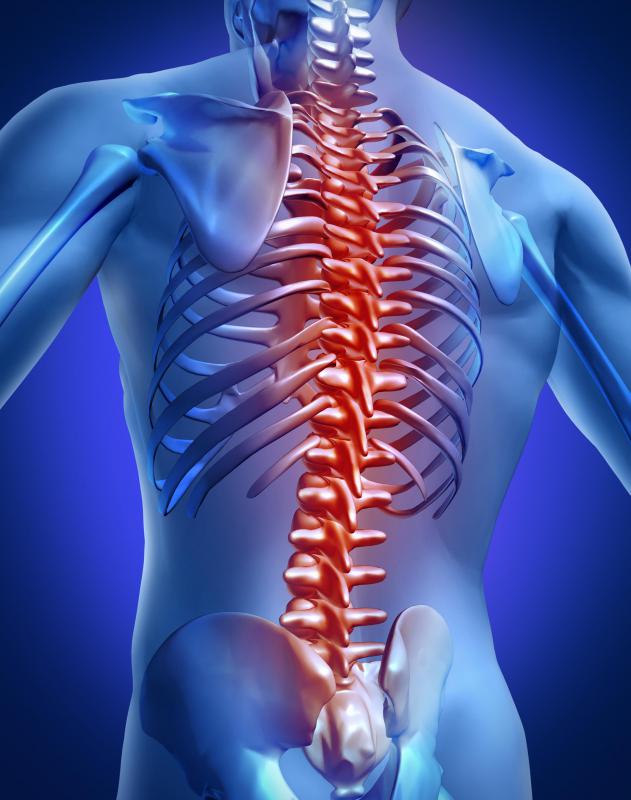At WiseGEEK, we're committed to delivering accurate, trustworthy information. Our expert-authored content is rigorously fact-checked and sourced from credible authorities. Discover how we uphold the highest standards in providing you with reliable knowledge.
What is Morquio Syndrome?
Morquio syndrome is a rare metabolic disorder characterized by the inability to break down long chains of sugars. These chains build up in the body, causing damage to the organs and brain since they cannot be eliminated. It is considered to be a disorder of carbohydrate metabolism. There is no cure for Morquio syndrome, with treatment focused on managing symptoms as they occur. Incidence rates vary by population and statistics are not terribly reliable. Estimates of frequency include one in every 40,000 births, one in every 75,000 births, and one in every 200,000 births.
This metabolic disorder is a recessive genetic condition. In order to develop Morquio syndrome, someone must inherit the gene from both parents. Parents will generally be asymptomatic carriers because they have a working gene which overcomes the Morquio gene. Two types are recognized, with one being distinguished by complete lack of production of a necessary enzyme, and the other with an enzyme deficiency. In both cases, the inadequate enzyme production means that the body lacks the tools it needs to process long sugars.

Also known as mucopolysaccharidosis IV, Morquio syndrome was first identified in the 1920s. One of the defining characteristics is dwarfism, common to all patients. People also develop joint hypermobility, enlarged fingers, widely spaced teeth, and enlarged rib cages which can take on a bell shape. Spinal and heart abnormalities are common in people with Morquio syndrome, and people can be at risk of progressive damage. People with a family history of Morquio syndrome should consider the fact that they may be carriers of the gene even if they do not have any symptoms.

Common issues people which Morquio syndrome face include heart failure, vision problems, and instability of the spine which can lead to difficulty walking and discomfort in some positions. People are also at risk of organ damage and failure caused by the buildup of long chains of sugars. The dwarfism associated with this condition can also be socially awkward for some patients, as they may not feel comfortable in society due to the attention attracted by their stature.

Treatment for Morquio syndrome is focused on managing symptoms and identifying complications quickly so that they can be treated. Patients can consult several different doctors for assistance with managing the condition, and various treatment options including prophylactic steps such as spinal fusion are available. When selecting a doctor to manage treatment, it is advisable to find one who has experience working with patients who have this condition.
AS FEATURED ON:
AS FEATURED ON:














Discussion Comments
I have a friend who has this. It's scary.
@feruze-- Unfortunately, a real treatment of morquio syndrome disease has not been found yet. But it will probably require an enzyme treatment since this is the cause of the disease.
There are various short-term treatments, but these only deal with symptoms. The article mentioned spinal fusion for example, and that's used to treat spinal injuries and prevent future ones. Surgeons fuse together multiple vertebrates to support the spine system with this method. This is the major treatment available for this syndrome as far as I know.
@feruze-- No, it's a very different illness and I don't think it has anything to do with diabetes.
First of all, it's really rare. There are probably only several hundred morquio syndrome patients around the world. They are born without enough amounts of two important enzymes. It's because of this that sugar chains build up and lead to skeletal problems.
Most people think that those who have this syndrome are dwarfs because they have growth issues. They tend to be very short with small body parts, but they're completely healthy mentally.
Have you heard of Hunter syndrome? That's probably the closest disease to Morquio syndrome.
Is morquio syndrome similar to diabetes?
It sounds similar to me because I know that diabetes patients don't have enough insulin or the right shape of insulin to metabolize sugar. This causes sugar and insulin to build up in the bloodstream and that's why diabetics have problems with blood circulation and heart disease. I read all about this when my dad became a Type II diabetes patient.
So are morquio syndrome patients also diabetics then?
If this illness is diagnosed early on and doctors start treatment, is it possible to avoid morquio syndrome symptoms, especially the physical abnormalities? At what age do symptoms generally appear and how effective is the treatment?
Post your comments